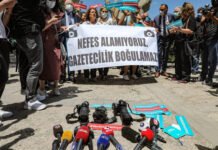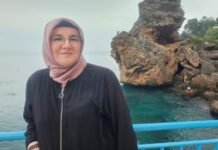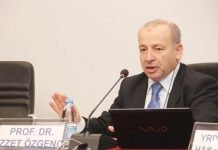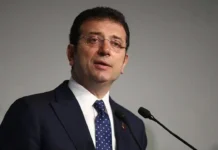Turkish government has detained at least 759 people over the past week as part of its massive post-coup witch hunt campaign targeting the alleged links to the Gülen movement, according to a written statement released by Turkish Interior Ministry on Monday.
The Interior Ministry said 759 people were rounded up in operations targeting the Gülen movement in between October 23 to October 30 and bringing the number of people detained in October 2017 to 3,158. The ministry announced on October 23 that 643 people had been detained the previous week
Meanwhile, the numbers of the military officers who were detained in Konya province over their alleged links to the movement has increased to 58 on Monday. The detentions came after detentions warrants were issued last Thursday by the Chief Prosecutor’s Office in Konya province against 70 on-duty military officers. Konya police had ordered the launch of operations in 31 provinces.
Police have also detained 11 people in Kahramanmaraş province over their alleged links to the Gülen movement on Monday. It was reported that the there are military personnels, health workers and teachers, including two women, among the detainees.
Also on Monday, 3 people were detained in the border zone of Edirne province as they have been preparing to flee from Turkey to Greece together with 2 Bangladeshi nationals who are claimed to be helping Turkish nationals. It was reported that gendarmerie detained the 3 people who allegedly used to use mobile phone messaging application ByLock, in border village of Üyüktatar.
The Samsun and Zonguldak chief public prosecutors’ offices have also issued detention warrants for 31 people as part of a witch-hunt targeting people claimed to have links to the Gülen movement, TGRT reported on Monday.
According to the report 17 people were detained in operations in seven provinces as part of a Zonguldak-based operation targeting students, public servants and teachers. In a similar development, police detained 14 people in Samsun province on accusations that they use a smart phone application known as ByLock.
Turkish authorities believe that ByLock is a communication tool among the alleged followers of the Gülen movement. Tens of thousands of people, including civil servants, police officers, soldiers, businessmen and even housewives, have either been dismissed or arrested for using ByLock since the failed coup attempt on July 15, 2016.

BUSINESSMEN KAVURMACI AND GÜLLÜ DEMAND THEIR RELEASES
Moreover, Ömer Faruk Kavurmacı, the son-in-law of former İstanbul Mayor Kadir Topbaş, made his defense on Monday in a court hearing and by denying claims that he was a member of the Gülen movement and demanded for his release.
The trial includes 86 business figures, who were members of the Turkish Confederation of Businessmen and Industrialists (TUSKON), which was affiliated with the Gülen movement and who face up to 22 years in jail if convicted, began in İstanbul on Oct. 23.
“I deny the accusations. I am not a member of the Gülen movement. I have not undertaken in its propaganda. I am not among the founders of TUSKON,” Kavurmacı said, as his defense at the court had been taken for the first time since the hearings started last week on Oct. 23.
“Following the speech of betrayal at the TUSKON general assembly [in 2014 when the TUSKON head had defied the then-Prime Minister Recep Tayyip Erdoğan], I did not applaud and protested by not standing. I was the one who was the first among the management to protest them. I unregistered my children from the Fatih Kolej [a Gülen-movement affiliated school] in June 2014. I have done this upon the call of the president, which shows I am not a member of the organization,” Kavurmacı said.
Kavurmacı continued his defense by saying he does not have an account with Bank Asya, which was seized by the state in 2015 over its links with the Gülen movement and has also never used ByLock. “I am a partner of a company that has 500 retail stores in the country and abroad with 4,200 employees. I demand that the measures and the decisions of a trustee appointment [on the company] be lifted, as the incident has turned unbearable for myself and my family,” he told the court in the five minutes he was given.
Kavurmacı, who was diagnosed with epilepsy in 2005, was arrested in September 2016 but was later released in May on the grounds that prison conditions had a negative effect on his health. Following criticism of his release from a number of opposition politicians and from members of the public, Kavurmacı was rearrested in June 2017.
Among those standing trial in custody in the case are also Faruk Güllü and Nejat Güllü, the brothers and co-owners of the well-known Faruk Güllüoğlu baklava chain.

“I am not a member of FETÖ. I have never joined any association meeting after 2010. Even through my name was written on the fifth and sixth general assembly of TUSKON, I was not there. Bank Asya is the bank that has been brought to the point of bankruptcy … I learned about the 15 July [2016] while I was in the store in Güneşli [neighborhood in İstanbul’s Bağcılar district], Faruk Güllü said, similarly demanding he be released and acquitted.
Both Kavurmacı and Güllü brothers’ demand for release were rejected by the court. The court adjourned the trial till Dec. 4, 2017. However, İstanbul’s 23rd High Criminal Court has released 10 of 31 suspects who have been in jail. The court also ordered a travel ban for the released, and lifted the legal ban on assets of all. The people released were named as Özlem Rukiye Kartal Üçüncü, Nalan Erpolat, Yüksel Nalbant, Ruhi Gürer, Semih Sadır, Rüstem Karaoğlan, Emrullah Emre Topal, Harun Akca, Nihat Kurt and Cahit Durmaz.
TUSKON was the umbrella organization for 211 businessmen’s associations in Turkey and 150 others in several countries. It was organizing investment and business and trade fairs under the auspices of the Turkish government. However, TUSKON was shut down on July 23, 2016 with decree-law no. 667 on false terror charges. The government has seized almost 1,000 companies in the last year alone, and $11 billion in corporate assets have been confiscated. The personal assets of TUSKON members were also frozen or seized.
The main accusation mentioned in the indictment against TUSKON members is their participation in the 5th Ordinary Meeting of the TUSKON General Assembly, which took place on March 1, 2014. At this meeting the president of TUSKON, Rıza Nur Meral, delivered a bold speech in which he stated, in relation to the December 17-25 corruption probes, that politicians who want to be rich should quit politics and public office and venture into their own businesses instead.
Erdoğan took the criticism of corruption in his government personally and launched a crackdown on TUSKON, encouraging members to defect. When he failed to destroy the organization, he orchestrated a criminal probe and eventually shut down the business group with decree-laws. The businessmen who were present at the meeting and applauded Meral’s speech were identified and eventually arrested.
Today regarded as a terrorist organisation, TUSKON, with its more than 40,000 members, was the most popular and effective businessmen’s organization in Turkey just three years ago. Then-Prime Minister Erdoğan, accompanied by several Cabinet ministers in charge of economy and trade, used to participate in the general assembly meetings of TUSKON.

Under arrest since May 2016, Baran was convicted of terror charges over his alleged links to the Gülen movement. Baran’s detainment came two months before the failed coup. The government crackdown against the movement supporters dates back to late 2013 when the government was implicated in sweeping corruption probes and then blamed the movement’s followers within the police for the investigations.
A Kırşehir court, on Monday, gave jail sentence of between 5 years to 42 years to 23 suspects, mostly businessmen, including Baran.
Turkey survived a controversial military coup attempt on July 15, 2016 that killed 249 people. Immediately after the putsch the ruling Justice and Development Party (AKP) government along with President Erdoğan pinned the blame on the Gülen movement.
Fethullah Gülen, who inspired the movement, strongly denied having any role in the failed coup and called for an international investigation into it, but President Erdoğan — calling the coup attempt “a gift from God” — and the government initiated a widespread purge aimed at cleansing sympathizers of the movement from within state institutions, dehumanizing its popular figures and putting them in custody.
Turkey’s Justice Ministry announced on July 13 that 50,510 people have been arrested and 169,013 have been the subject of legal proceedings on coup charges since the failed coup.















